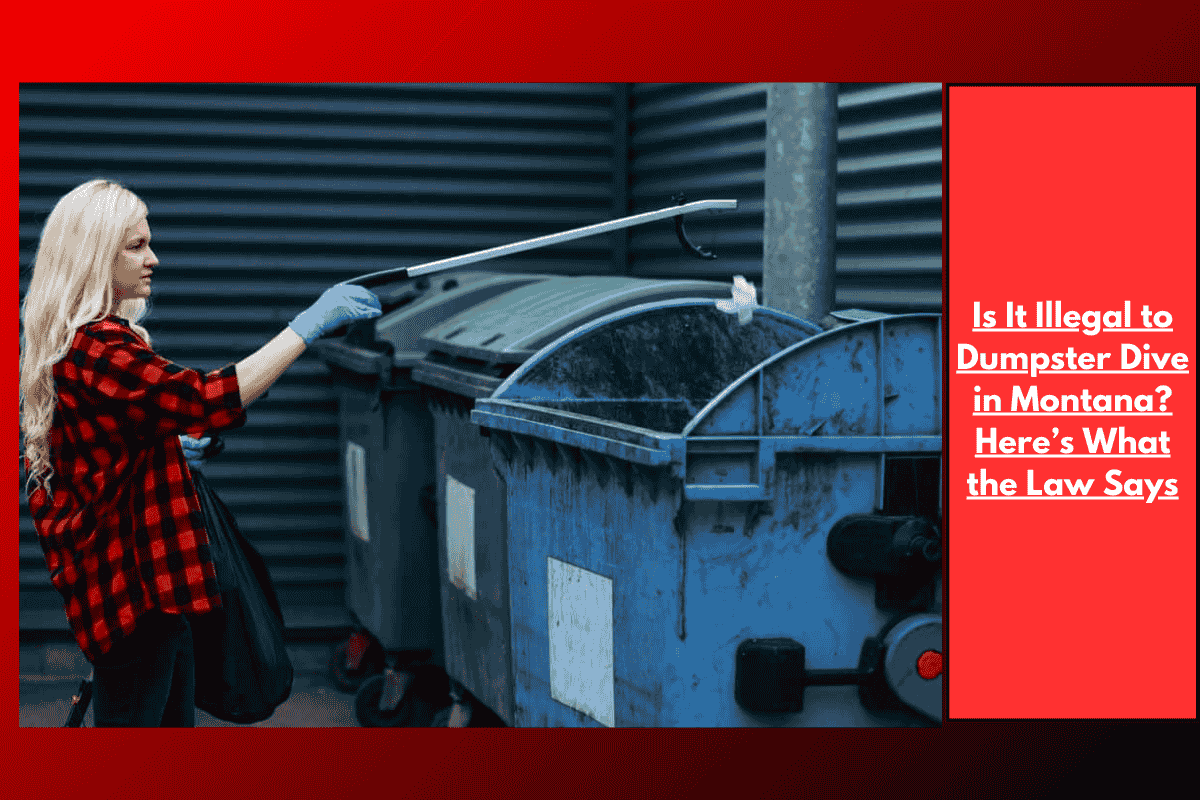Dumpster diving, the act of searching through commercial or residential trash to find food, materials, or other items that can be reused, is a practice that raises legal and ethical questions. While it may seem harmless or even eco-friendly to reclaim discarded items, the legality of dumpster diving can vary from state to state. In Montana, there are certain rules and regulations to consider if you’re thinking about dumpster diving. Here’s what you need to know about the law in Montana regarding dumpster diving.
Is Dumpster Diving Legal in Montana?
In general, dumpster diving itself is not inherently illegal in Montana. However, the legality depends on several factors, including where you are diving (private or public property), what you are taking, and the manner in which you are doing it. While Montana does not have any specific laws that ban dumpster diving outright, there are several legal issues that can make it unlawful under certain circumstances.
Trespassing Laws
One of the biggest legal concerns when dumpster diving is trespassing. If you are diving in a dumpster that is located on private property, such as behind a business or a private residence, you could be charged with trespassing. Under Montana law (Title 45, Chapter 6, Part 2), entering or staying on private property without permission is considered trespassing, and you could be asked to leave, fined, or even face criminal charges if you refuse.
In most cases, dumpsters behind businesses or private homes are on private property, and accessing them without the owner’s permission can be considered trespassing. This is why it’s important to get permission from the property owner or manager before diving in such dumpsters.
Theft and Property Rights
Another issue is theft. If you take items from a dumpster that are clearly marked or belong to someone else, even if they are discarded, you may be committing theft. In Montana, if the item has not been abandoned and still belongs to someone, you could be charged with stealing. Some businesses might still consider their waste as their property, even if it’s been thrown away.
For example, if a store owner or business discards food or other goods that still have value, the owner may technically retain ownership of those goods until they are officially deemed abandoned. Taking items that are still legally the property of someone else could be seen as theft.
Municipal or Local Ordinances
Many cities or municipalities in Montana may have local ordinances that regulate or restrict dumpster diving, particularly when it comes to health and safety concerns. For example, some cities may have regulations about what can be thrown away in dumpsters (especially food items) or rules regarding rummaging through trash for safety reasons. For example, a city like Billings or Missoula could have local codes that prohibit digging through trash in certain areas due to safety concerns, such as sharp objects or hazardous materials.
It’s a good idea to check local ordinances in the specific city or county where you plan to dumpster dive, as regulations can vary from place to place.
Health and Safety Concerns
Another important factor to consider is health and safety. While it may not be illegal to dive in a dumpster, doing so could pose risks to your health. Many businesses discard food or items that are no longer safe for consumption, and rummaging through such waste can expose you to bacteria, sharp objects, and hazardous materials. In some cases, health regulations may limit how accessible dumpsters are for safety reasons.
Some states or cities may even have laws that restrict public access to dumpsters containing certain items (like discarded food). These laws are designed to prevent public health risks associated with consuming discarded food, especially food that could have been contaminated.
Local Dumpster Rules for Businesses
Some businesses have specific rules about whether you can access their dumpsters. For instance, a store or restaurant may post signs on their dumpsters indicating that it is off-limits to the public. If you ignore these signs and go dumpster diving anyway, you could be charged with trespassing or even violating private property rules.
In Montana, dumpster diving is not outright illegal, but there are legal risks and considerations you should be aware of. Trespassing on private property, stealing items that don’t belong to you, and violating local ordinances could result in legal consequences. Always be sure to ask for permission before diving in dumpsters on private property, and make sure to follow any local laws and ordinances that may apply. Additionally, consider the health and safety risks of dumpster diving and take necessary precautions if you decide to proceed.
SOURCES
[1] https://litefm955.com/is-dumpster-diving-legal/
[2] https://my1035.com/dumpster-diving-laws-in-montana/
[3] https://collincountymagazine.com/2025/07/06/is-it-illegal-to-dumpster-dive-in-montana-heres-what-the-law-says/
[4] https://www.legalmatch.com/law-library/article/is-dumpster-diving-illegal.html
[5] https://theriver979.com/dumpster-diving-great-falls-montana/














